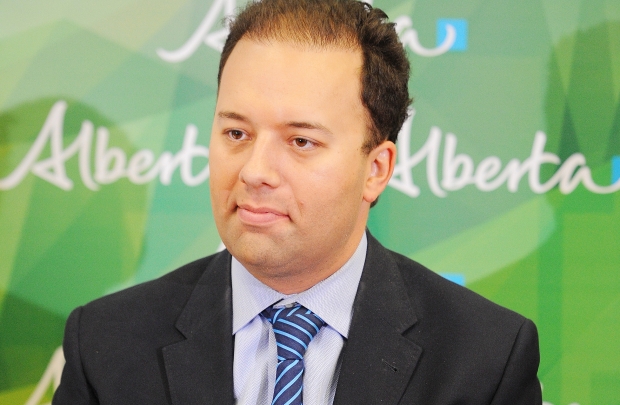EDMONTON – Proposed changes to Alberta’s civil forfeiture laws will make it faster and easier for the government to seize money, cars and houses from alleged criminals.

Justice Minister Jonathan Denis introduced the changes in the legislature this week, saying the amendments in Bill 16 will “help prevent baseless and frivolous legal actions that would delay the forfeiture process.”
Karl Wilberg, director of the Alberta’s civil forfeiture office, said after four years and 600 cases, justice officials see a need to eliminate costly stalling tactics that clog up the process.
“What we noticed was that 70 per cent of respondents never seriously contest our claim,” Wilberg said. “But what they do is they ignore the requirements of our act, where they are supposed to file an affidavit where they set out what they were doing with the property and how they got it. What they end up doing is they’ll go to court repeatedly asking the judge for more time, more time, more time. And we keep waiting.”
Alberta started allowing police to seize “tools” or proceeds of crime in 2008 under the Victims Restitution and Compensation Payment Act. The goal is to disrupt criminal activity such as drug dealing and divert that money to help victims of crime.
The Supreme Court ruled in 2009 that the Crown has the right to confiscate the proceeds of crime.
The Civil Forfeiture Office has seized about $25 million in property and cash since it started. But the law is controversial in some circles because it allows the government to seize people’s property without proving they are guilty in criminal court.
- Arrest made after police issue emergency alert about ‘dangerous man’ in Bible Hill, N.S.
- Grandparent scam: Canadian seniors with landline phones targeted, out about $2.2 million
- 3-year-old Elijah Vue still missing: Man pleads not guilty to child neglect
- Closing arguments presented in Michael Gordon Jackson abduction case
People have the right to fight the confiscation, but must tell a judge where the item came from and prove it is not tainted by crime. Since no one’s freedom is on the line, the government faces a lower standard of proof.
There are three changes proposed in Bill 16 that should make the process faster, and less costly for Alberta taxpayers, Wilberg said.
The most significant is a new “administrative” forfeiture procedure that can be applied to items such as vehicles, which account for about half of Alberta’s seizures.
If the Crown wants to seize an item they believe is tied to crime, such as a car used by an alleged dial-a-doper, they will send the owner information by registered mail alerting them to that plan. That person will have 30 days to return a form saying whether they want to fight the seizure.
“We leave the choice to the respondent,” Wilberg said. “If they want to fight about it in court, all they have to do is fill out the form. Then they send it in and then we go off to court just like we always did. On the other hand, if, as is very often the case, they’re not really serious about it and have no intention to dispute our claim, they probably won’t complete the form.
Any attempts to confiscate homes or land will only be allowed through existing court procedures, Wilberg said.
A second change in Bill 16 will limit the number of adjournments a property owner can ask for before filing an affidavit explaining why the cash, car or property legitimately belongs to them.
“What’s clear with this bill, once you get to the point where you’ve got at the very least your second adjournment, and you’ve paid $500 for that, you don’t get a third,” Wilberg said. “We figure that is fair.”
Those limits will still give people about three months to explain the history of the property, he said.
A third change will allow courts to presume that money or other assets worth more than $10,000 found near drugs or stored in a way not typically associated with legitimate business activity, is connected to crime.
Currently, the government must call an expert to prove cash found in such a fashion is tied to illegal activity.
Wilberg said he believes enough checks have been included to protect people’s rights. For example, someone who says they were not notified of an administrative procedure will be allowed to ask the courts to reverse the decision.
Linda McKay-Panos, executive director of the University of Calgary-based Alberta Civil Liberties Research Centre, said she had some concerns about the details of the bill.
For example, she said, it would be much better if people had to be notified of the administrative forfeiture procedure with a hand-delivered document rather than through the mail, she said.
The government needs to be careful with its resources, she said. “But on the other hand, because of the implications of some of this, people losing their houses, for example, I think we just have to be really careful and make sure we follow proper procedures.”
Opposition MLAs said late this week they were still considering the details of the bill, which received first reading in the legislature on Wednesday.
“The goals of the legislation are laudable, but the devil’s in the details,” Wildrose justice critic Shayne Saskiw said. “Of course we need to go after organized crime, we also have to ensure due process is followed. So we still need to go through both the details of this legislation and the underlying legislation to make sure that’s done.”
NDP MLA David Eggen said his party wants to make sure the new administrative process is laid out in a clear and concise way.
“We certainly agree with streamlining the process but we don’t want to see unforeseen delays by moving from a legal to an administrative basis,” Eggen said.

Comments